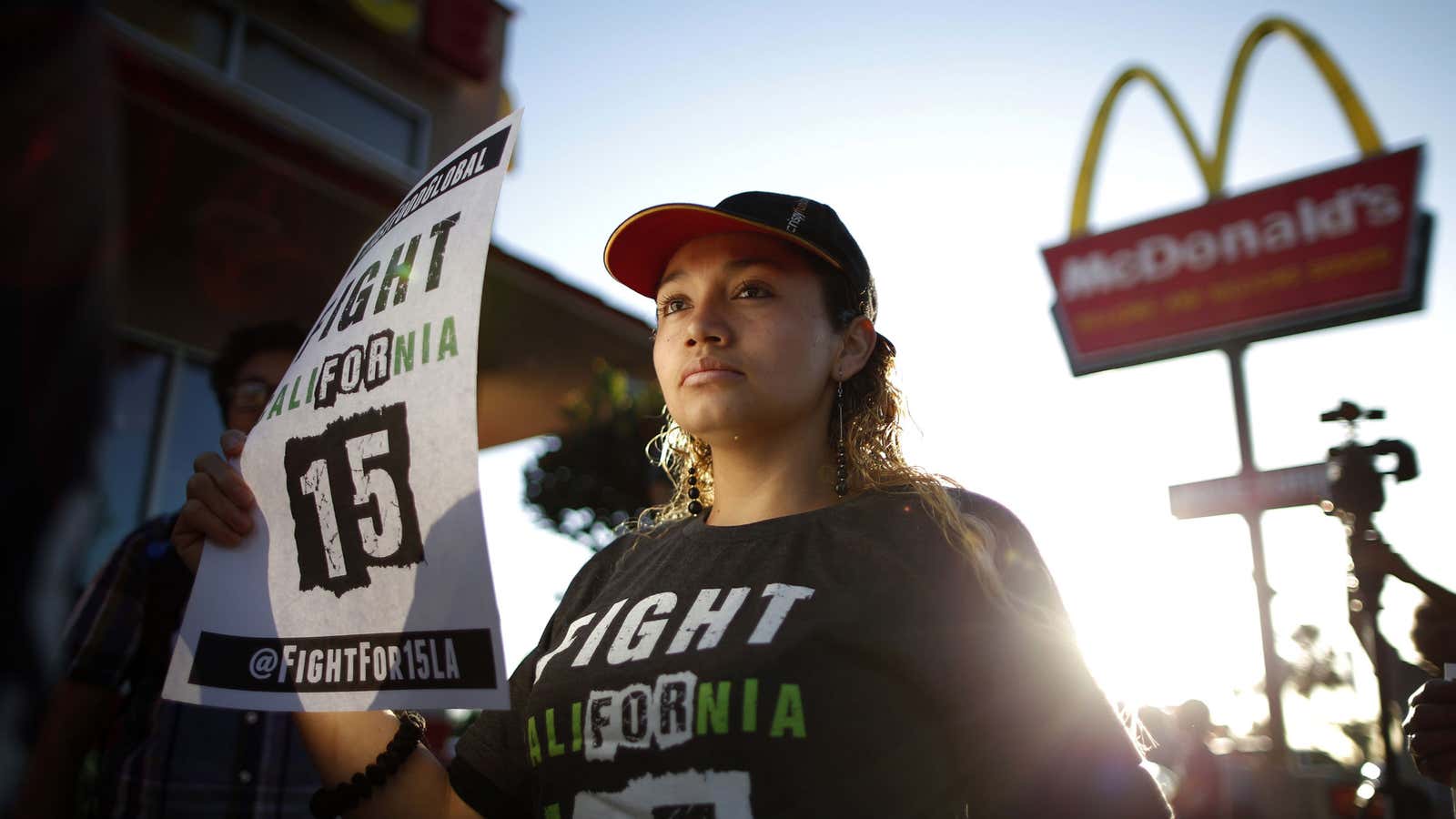As fast-food workers, we prepare burgers and fries, not balance sheets. We struggle to survive from paycheck to paycheck, without million-dollar annual bonuses or second homes. We often work behind the scenes—or counters, getting little of the credit for billions of dollars in company profits.
And yet, fast-food workers don’t just have the attention of the industry—we have it terrified.
In the past year and a half, our protests over poverty wages and the right to form a union, without retaliation have spread like wildfire. The first strike, just a year and a half ago, involved a few hundred workers in one city. Five strikes later, the one in May took place in more than 150 US cities, with additional protests in 33 countries. And this weekend, I am traveling from South Carolina to Chicago with more than 1,000 workers for our first-ever nationwide convention, where we’ll discuss how to escalate our fight for $15 an hour and a union.
McDonald’s recently warned investors in its annual report filed with the Securities Exchange Commission of the potential “material impact on results” from “boycotts or protests, labor strikes and supply chain interruptions.” The company also warned that pressure for higher wages “may intensify with increasing public focus on matters of income inequality.”
How have seemingly powerless people like me mounted a serious challenge to some of the richest companies in the world? Here are the five key ingredients:
Have truth on your side. We make a median wage of $8.94, with an average of only 24 hours a week. Many, including me, making much less. Fast food CEOs, meanwhile, are living large. They earned an average of $26.7 million in 2012, making for CEO to worker pay gap of 1,200 to one, the highest, by far, of any industry. They could afford to pay a living wage.
The industry has no way to refute these facts. McDonald’s implies that it shouldn’t have to pay a living wage because “McDonald’s represents a first job” and “a pathway to a long-term career.” In reality, half of the industry’s workers are over 28 years old. At most, 2% of the jobs are in management, and many of those barely pay more than minimum wage.
Raising wages isn’t just good for workers and families; it’s critical to kick-starting our economy and boosting bottom lines. When workers like me don’t have enough to afford basic necessities, we all suffer. More than half of fast-food workers are on public assistance, costing taxpayers $7 billion a year. Just look at what’s happened this year. All 13 states that raised their minimum wage in 2014 have had stronger employment growth than the 37 states that didn’t, according to a recent report. Retailers like the Gap who raised wages say they are already seeing benefits, too.
Spur local change. After six strikes, fast-food workers have helped get the whole nation talking about the need to raise poverty wages. What many initially laughed at our call for $15 an hour—is today the benchmark for cities and states around the country. Seattle passed a $15 minimum wage and cities from San Francisco to Chicago to Los Angeles are increasingly adopting our rallying cry.
We’ve also organized to raise the issue of wage theft. A study released in April found that 89% of fast-food workers have been forced to do off-the-books work, been denied breaks, or been cheated out of overtime pay. Fast-food workers in three states have filed class-action lawsuits over wage theft, and New York State has already reached settlements with several companies over the issue, including McDonald’s and Domino’s.
Go global. The spread of our movement overseas spells trouble for fast-food giants. In May, there were protests or strikes in Germany, Italy, Brazil, Japan and dozens of other countries. There were even flash mobs at five McDonald’s in the Philippines. As one expert recently put it, “if the worker movement prompts this much concern in the US where sales are slumping, imagine the level of alert once it reaches countries that are key drivers of fast-food corporations’ growth.”
Show them who’s boss. No, not what you think. We don’t want to be the boss. We want McDonald’s and other fast-food companies to acknowledge that they are bosses. But since they keep saying that franchisees are in charge, and that they have no responsibility for workers, we’ve filed federal charges arguing that there’s no doubt who the boss is. According to multiple news reports, the National Labor Relations Board’s general council is about to issue a complaint saying that McDonald’s is indeed an employer. Maybe then they will will stop blaming our poor treatment on franchisees and pay us a wage we can live on.
Take risks. We’ve learned our history from the civil rights movement and other Americans who stood up for what is right, at great personal risk. We’ve put our jobs on the line to strike. At the McDonald’s shareholders meeting in May, more than a hundred of us were arrested—a major escalation in our campaign.
But still, fast-food companies refuse to listen. That’s why in Chicago this weekend, workers from every corner of the country are pledging to do whatever it takes for $15 and a union, including getting arrested.
I’ve worked at McDonald’s for 10 years and still make $7.35 an hour—only pennies above the federal minimum wage. My four girls deserve better. I deserve better. McDonald’s and the other fast-food companies are going to learn that when you aren’t paid enough to survive, you’re willing to do whatever it takes, for as long as it takes, until you are treated fairly.
